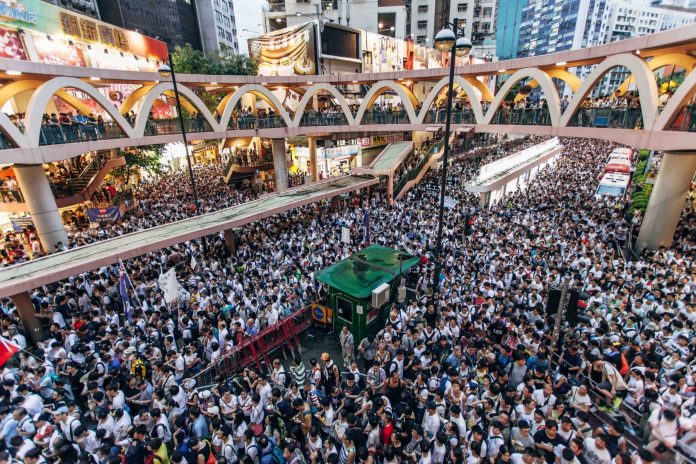
A controversial extradition bill enabling China to extradite fugitives from Hong Kong prompted more than one million Hong Kongers to take to the streets on Sunday, June 9 2019, as protesters gathered at Victoria Park in central Hong Kong, then marched three kilometres to the Legislative Council at the Admiralty business district. The protest was organised by Civil Human Rights Front, a Hong Kong civil rights organisation formed in 2002.
According to Civil Human Rights Front, more than a million protesters took to the streets in one of Hong Kong’s biggest street protests since 2003, when more than 500,000 Hong Kongers successfully blocked the passing of the sedition law with street protests. The protesters, many wearing white and waving placards, targeted their ire at Carrie Lam, the chief executive of Hong Kong, calling for her resignation and for the extradition bill to be struck down. The estimates provided by the Hong Kong police put the number of protesters at 240,000. With the protest lasting into the night, more than seven protesters were arrested by the police with pepper spray and batons being used as police tried to clear protesters off the main roads.
The tabling of the bill was prompted by a homicide case in Taiwan, where a 20-year-old Hong Kong woman was allegedly murdered by her boyfriend while on holiday in Taiwan. The bill was proposed to enable the suspect to be sent from Hong Kong to face justice in Taiwan.
However, the Taiwanese government has stated that it will not recognise the new law if it meant putting Taiwanese citizens in peril of being extradited to China. The main concern over the bill is the fear the Beijing government might use the new law to extradite human rights activists, political dissidents and opponents to China, where the legal system is politicised.
Smaller protests have also broken out across Australia in Sydney, Canberra, Melbourne and Brisbane in support of the protests against the extradition bill in Hong Kong. With around 100,000 Australians currently living in Hong Kong, the passing of the extradition bill would allow Australians living in Hong Kong or passing through Hong Kong to be extradited to China and imprisoned if they are deemed to be a foreign threat. The fact that two Canadians, former diplomat Michael Kovrig and businessman Michael Spavor, were arrested by the Chinese government in December 2018 on spying charges and have not been heard from since, only fuels the shroud of controversy surrounding the new bill.
Hong Kong Chief Executive Carrie Lam has continued to defend the bill as a much needed tool to combat transnational crimes, stating that, “this bill is about putting in place a special surrender arrangement, that is, a case-by-case arrangement, with all the other jurisdictions that Hong Kong has not yet had a long term agreement.
The bill is currently due for a second reading on June 12, 2019. The Hong Kong government has stated that it wants the bill to be passed before the summer break.










